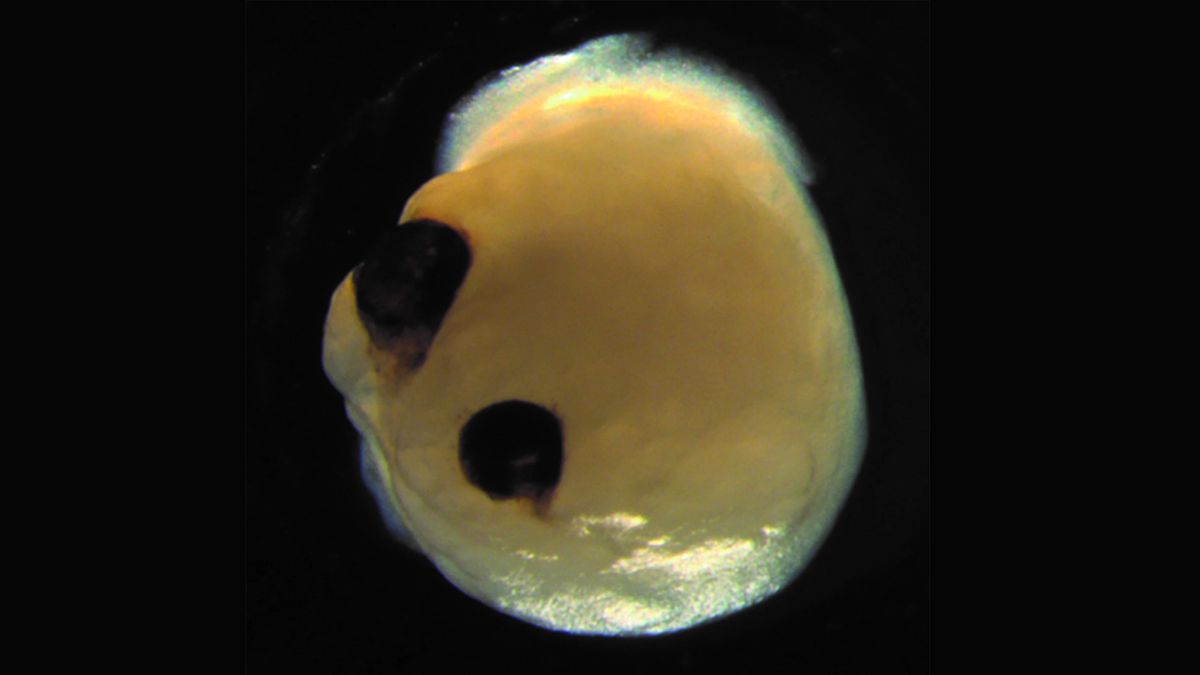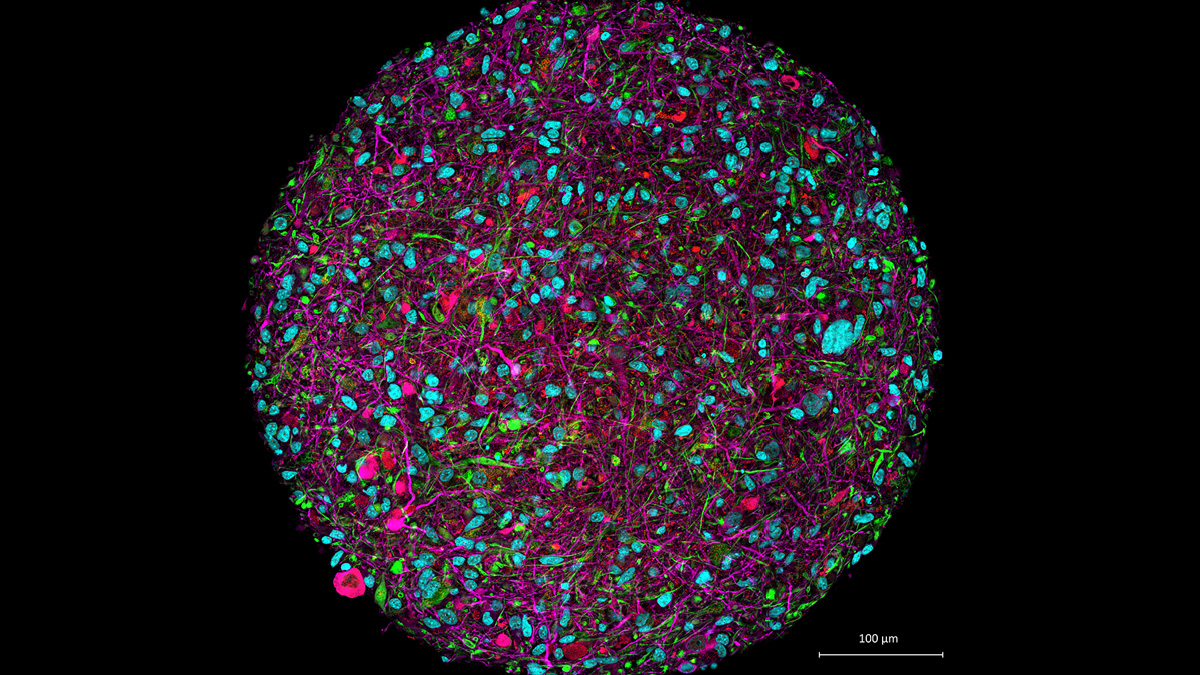Science
Related: About this forumLab-grown minibrains will be used as 'biological hardware' to create new biocomputers, scientists pr
Lab-grown minibrains will be used as 'biological hardware' to create new biocomputers, scientists propose
By Ben Turner published 28 February 2023
A new proposal suggests using stem cell-derived 'minibrains' to create brand-new biocomputers. Such 'organoid computers' could be far off, but ethical questions abound.

A brain organoid grown with rudimentary optic cups. (Image credit: Elke Gabriel)
Lab-grown "minibrains" could someday be linked together to act as powerful and efficient biocomputers, scientists have suggested.
In a proposal published Feb 28. in the journal Frontiers in Science(opens in new tab), a multidisciplinary group of researchers outlined their plans to transform 3D clumps of human brain cells, called brain organoids, into biological hardware capable of advanced computational tasks — a field they have named "organoid intelligence" (OI).
"While silicon-based computers are certainly better with numbers, brains are better at learning," corresponding author John Hartung(opens in new tab), a professor of microbiology at John Hopkins University, said in a statement(opens in new tab). For example, AlphaGo — the AI that beat the world's top Go player in 2017 — "was trained on data from 160,000 games. A person would have to play five hours a day for more than 175 years to experience these many games."
Brain organoids are small, lab dish-dwelling clumps of stem cells that have been cajoled into 3D structures that mimic the structure and function of the human brain, but are simpler than the full-size organ. First produced in 2013 to investigate microcephaly, a condition in which an infant's head is much smaller than average, the brain blobs have since been used to study diseases such as Alzheimer's, Parkinson's and Zika and to repair injured rat brains with well-placed grafts. And recently, they've even been taught to play the video game Pong.
More:
https://www.livescience.com/lab-grown-minibrains-will-be-used-as-biological-hardware-to-create-new-biocomputers-scientists-propose
👀
lapfog_1
(30,158 posts)by the time they figure this out, silicon brains will far surpass even human brains in the AI / deep learning arena.
And silicon is well understood and easy to program.
and, yes, I work for the leading maker of such silicon (full disclosure)
Duppers
(28,246 posts)Heard there's a big one coming out soon.
You're in a MOST interesting, impressive field.
lapfog_1
(30,158 posts)power consumption.
Duppers
(28,246 posts)Judi Lynn
(162,384 posts)By Nicoletta Lanese
published 28 February 2023
Brain organoids, or minibrains, contain human tissues and have potential uses in basic research, drug development and computer science.

Brain organoids are essentially lab-grown minibrains that mimic structural and functional features of full-size brains. (Image credit: Pasca Lab, Stanford University)
In the past decade, lab-grown blobs of human brain tissue began making news headlines, as they ushered in a new era of scientific discovery and raised a slew of ethical questions.
These blobs — scientifically known as brain organoids, but often called "minibrains" in the news — serve as miniature, simplified models of full-size human brains. These organoids can potentially be useful in basic research, drug development and even computer science.
However, as scientists make these models more sophisticated, there's a question as to whether they could ever become too similar to human brains and thus gain consciousness, in some form or another.
How are minibrains made?
Scientists grow brain organoids from stem cells, a type of immature cell that can give rise to any cell type, whether blood, skin, bowel or brain.
More:
https://www.livescience.com/minibrains-brain-organoids-explained
Judi Lynn
(162,384 posts)1 March 2023 / Jacinta Bowler
If organoid can learn from its environment, can it feel suffering?

A magnified image of a lab-grown brain organoid with fluorescent labeling for different cell types. (Pink - neurons; red - oligodendrocytes; green - astrocytes; blue - all cell nuclei) Credit: Thomas Hartung, Johns Hopkins University
A new paper has been released that outlines a type of ‘roadmap’ for biocomputers – computers drawing memory and power from human neurons – or brain cells.
The crux of the new work is a term called ‘organoid intelligence’ – this is the idea that a small group of human neurons could begin understanding it’s environment, learn and remember.
But to understand this, we first have to look to what an organoid is and how they are made.
What is an organoid?
Organoids are smaller, simpler versions of any organ. For example, there’s been organoids of livers, kidneys, hearts, brains and even tear glands.
They were first created in the early 2010s, after Japanese researchers discovered how to turn mature cells back into stem cells. These stem cells can then be programmed to become any cell in the human body.
More:
https://cosmosmagazine.com/health/biocomputer-organoid-intelligence-explainer-dishbrain/
Judi Lynn
(162,384 posts)28 February 2023 / Jacinta Bowler
It started with Pong.
Researchers have created a roadmap for how to build tiny biocomputers out of human neurons or brain cells.
“We can use a culture of the human brain to show something which is not just living cells. We can show that this is learning, this is memorising, this is making decisions, it is possibly even at some point, ‘sentient’ in the sense that it can sense its environment,” Professor Thomas Hartung, a Johns Hopkins ‘organoids’ researcher, told Cosmos.
“We are the explorers who have stumbled into a completely new field.”
The Australian company behind ‘Dishbrain’ (which learnt to play Pong last year) is collaborating with scientists at Johns Hopkins University in the US, whose research paper has outlined how these ‘biocomputers’ could allow us to understand memory, learning and other integral parts of human understanding. They also suggest it could rival supercomputers or AI.
More:
https://cosmosmagazine.com/health/biocomputers-organoid-intelligence-neurons-science/
Duppers
(28,246 posts)Mind-blowing advancements on the horizon.
And some coming out very soon, I think.